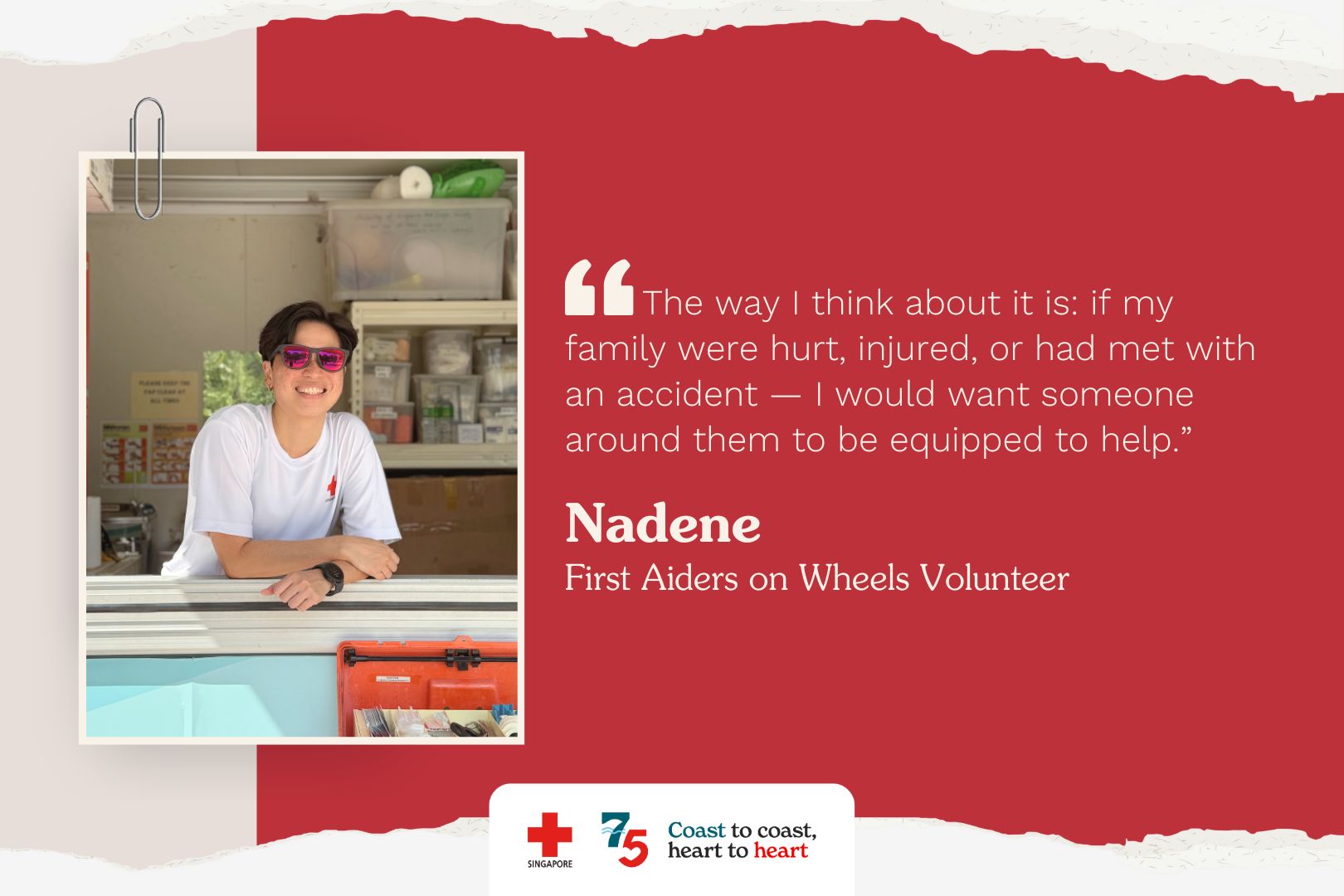
The Singapore Red Cross First-Aiders On Wheels (FAOW) form a network of lifesavers who volunteer their skills, time, and energy, to ensure that our community spaces remain safe for all to enjoy. Nadene, 38, is just one of the many two-wheeled heroes you’ll see patrolling the stretches of parks and beaches, or stationed at the first aid posts that dot our island home.
Nadene was attending a diving course when one of the fellow learners suffered from a seizure and started foaming at the mouth. As all instructors must be first aid trained, she watched in awe as their dive master rushed over to the affected learner and rendered Standard First Aid.
Later on when she was in university in Australia, she encountered her second case. Where one of the PhD students she was working with was found concussed. Even though Nadene rushed to call emergency services, she felt helpless as she was not CPR trained. Thankfully, there was another PhD student there who was.
It was at that moment that Nadene decided to get a first aid certificate in Australia. When she returned home to Singapore, she got recertified with the Singapore Red Cross, through the Responders For Resilience programme that included Standard First Aid, Psychosocial First Aid, and Befriending.
“At the end of the programme, they introduced us to all the available volunteering programmes. And I knew I wanted to get my hands dirty. Being certified is one thing, but being on ground with the skills to manage a casualty is another. That's why I started volunteering with First Aiders on Wheels.”
For the Common Good
Nadene once saw a severe fall case that was a result of a child going rollerblading without any protective gear. Her cuts and abrasions were deep and the bleeding went on for a while. In instances like these, how should a common passerby offer help?
“First, look around. If you're on the streets or near a shopping center, most concierges should have a First Aid kit. Sometimes going straight to F&B places will be helpful because they do have First Aid kits as well.
The urge to use a wet wipe or a tissue to wipe the blood is very strong but I would recommend not to do that. Wet wipes that have alcohol actually hinder the healing of the wound and are very, very painful.
If you do have water around, it is best to use the water to cleanse the dirt off the wound first. And then if anyone has some clean towels around, you can use that to cover the wound until you find a plaster or bandage.
Sometimes we get children who are lost. That’s an instance where we can help even if it’s not related to Standard First Aid.
One of the things we try and think about is — what if you don't have supplies? What can you do? We're not always going to have supplies and things can happen at any moment. It’s up to you to think outside the box to help someone in need.”
Serving the Community
“One thing we don't see a lot of are Singaporeans out in the community. So I do feel like a portion of what drives me is based on a certain level of civic duty. When you see so many cases on a regular basis, there’s a lot of satisfaction in being able to help people who are in need.
Just being out here as a Singaporean also contributes to reputation building at the end of the day as well. We have so many tours in the park as well. Foreigners go wow you guys have this in the parks and you guys can take care of us.”
A Day in the Life of an NDP Volunteer
“We report pretty early. We meet at 1:00 and go all the way to about 9:30, 10:00. After being briefed by the SAF volunteers, we get split into groups amongst the stands.
Each volunteer takes a portion of the stands. From there, we stay within our little groups with the team leaders. We try to make sure all volunteers get a good view so that we can ensure that everyone's safe. We do a lot of comms checks to make sure everyone can hear each other because there are so many people and so much going on.
We try to observe people who maybe look like they're unwell, or maybe not looking so great. Then we keep an eye on them as well from there. The casualties we get usually are fainting cases and a few abrasions from falling because of the stairs.”
Calling All Kind Hearts!
“You don't have to learn to cycle or know how to cycle to be here and volunteer with us. We have volunteers who are not able to cycle, or are not comfortable cycling. Still, they gain experience by learning from each other on how to deal with casualties from being stationed at the First Aid Post.
I think the satisfaction of helping people in the park, or over at NDP motivates me to volunteer. However, one of the best benefits is actually meeting people who are like-minded!
I also get to learn from folks who are younger but have been doing this way longer than I have. They teach me the tricks of the trade and share cases that I can learn from.
The way I think about it is: if my family were hurt, injured, or had met with an accident — I would want someone around them to be equipped to help. We've all seen videos where someone gets hurt and there are a ton of people around but no one is helping them; all they do is take out their phone.
Think of that, and then think of something that suits your interest — and then go out and volunteer with us!”

